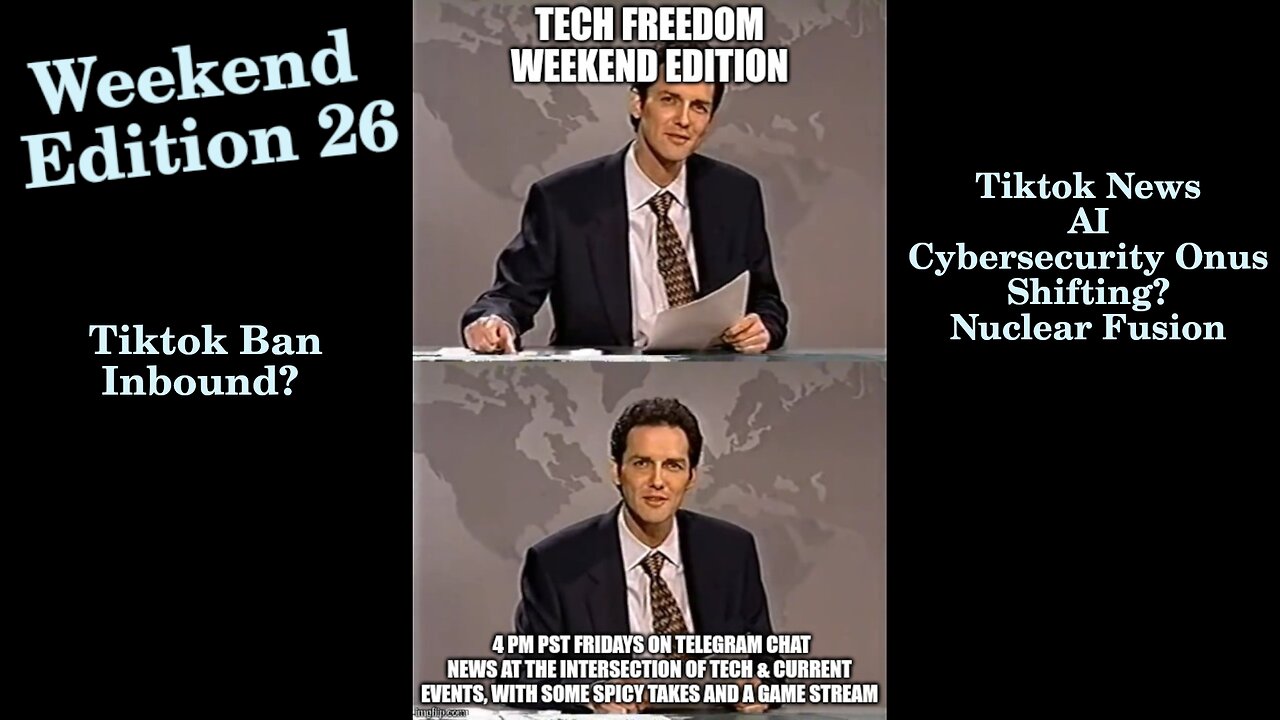Premium Only Content

Weekend Edition 26: Tiktok Ban Coming in US?
Tiktok News
AI
Cybersecurity Onus Shifting?
Nuclear Fusion
WE 26.1 – Oooh, Tiktok is in for a Bruisin’
So on one hand the US has banned it from use on gov’t phones over theoretical concerns (which I have covered ad nauseam over the last couple of months or so), but indulge me and we will talk about them once more. Concern 1: Amount of data collection. Concern 2: It’s CCP Spyware. Concern 3: Algorithm could be used to brainwash users. Of course the company has addressed these 3 concerns recently, and according to them, “we collect an amount of data that is in line with the rest of the social media industry”, and this has been independently confirmed by both the Citizen Lab and the Georgia Institute of Technology. However, there was an Australian study that came out last year which claimed the opposite. Needless to say, I would much rather advocate for a far more private internet where we only share as much as each of us is comfortable with sharing, not metadata which could lead to direct ad targeting or even more nefarious things.
This leads directly into concern 2: which the company refutes as strongly as it can, stating that the company “has not provided user data to the Chinese government, nor would we if asked “. The problem and the source of this concern for myself and other privacy experts (not that I call myself an expert, I’m a ‘pert’, just pointing you to people who know more, and providing some solutions to these issues I see), is that there is a clause in Chinese law which states that “all Chinese organisations and citizens should support, assist and co-operate" with Chinese intelligence efforts.” Is this as much of a bugaboo as we think? Some think that this is cherry-picked and far out of context, in that there are other clauses which expressly protect the privacy of Chinese nationals as well as other who have data moving in and through China. Am I convinced that it is ok? No. On the other hand, they very loudly claim that they do not store any US user data in China, but do keep it in US and Singaporean data centers. I see a company which is desperate to not lose a huge market. Beyond the data and the privacy, how do we know that the algorithm couldn’t be harmful? Here lies concern 3:
It could brainwash users into believing or acting in ways that do not benefit their own nations, even to the point of becoming suicidal. It is said that the algorithm is like crack cocaine, and users become dependent on the content and even become influenced by what they are being uncritically fed. One concern is that censorship could be utilized at the behest of the CCP to run influence operations, aside from the tracking potential, along with deep knowledge about preferences and pain points for US citizens and officials. When tested by Citizen Lab, it was found that there was very little censorship on the platform, even of content critical of the CCP and even President Xi.
I started with on one hand, well here is another: as of Tuesday 3/7 the Canadian gov’t will take similar action with its federally assigned phones for officials and employees. Another aspect of this is that the overall US ban is getting closer and closer to being a reality, with the House likely to pass it onto the Senate in the coming week. On one hand, excellent, on the other, many people have become TikTok influencers and make a living that way. It is a tough situation, as much as I would personally love to see this questionable app get completely shuttered in the US.
TikTok itself has implemented a half-measure to curb use of the app by minors. Plaudits where plaudits are due, however, it is very easy to bypass the 1 hour limit. It is kind of like the warnings that the Nintendo Wii used to give about “getting outside” because you had been playing for too long at a sitting. On the other hand, it is a speedbump, and if parents have set up family accounts with TikTok, they have enhanced parental controls. Again, *slow clap*...
https://www.cnbc.com/2023/02/28/new-tiktok-ban-is-poised-to-advance-in-congress-.html
https://www.bbc.com/news/technology-64797355
https://www.bbc.com/news/world-us-canada-64792894
https://www.bbc.com/news/technology-64813981
#weekendedition #tiktok #banhammer #mixedbag #fear #lackofclarity #TechFreedom #FOSSNews
WE 26.2 – AI News for the Week
2a) YouTube to “Balance Generative AI with Responsibility
The new CEO has signaled his priorities for the platform for this year, and developing “thoughtful guardrails” for generative AI so that it doesn’t get abused on the platform. He fully recognizes the potential for both abuse and amazing creativity. He also listed a litany of other stats to highlight how YouTube is adding desirable features (this CEO used to be the head of product development for the platform).
· YouTube has captioned more than 6 billion videos.
· More than 1 billion viewers daily are watching videos with captions enabled.
· YouTube generated 2 trillion views of gaming-related content last year.
· 6 million viewers paid for YouTube channel memberships in December, a 20% increase from a year earlier.
Those are some eye-watering numbers. Then again, YouTube is a titan in the industry, a pioneer in the VOD and streaming space. It will be interesting to see how things shake out with AI powered videos on YT.
https://www.cnet.com/tech/services-and-software/youtubes-new-ceo-says-hell-balance-generative-ais-creativity-with-responsibility/
2b) ChatGPT EVERYWHERE... Why?
OpenAI has opened up their API for everyone to access, so you can expect to see integrations in many apps and websites. A few big ones that are experimenting are Instacart, Snap, and Quizlet. Snap looks to use their integration for making recommendations, helping users to make plans, or even write haiku in seconds. Quizlet will use it to generate quiz questions to help their users to prepare for exams and the like. Shopify and Instacart are looking to add in the ability to ask the app questions to help guide your shopping decisions.
There is an arms race on now, among these larger companies, so that they do not fall behind their competitors in gathering more user data, marketing more effectively, and the like. You can trust that I will never utilize anything like that. There will always be a person on the other side of the screen in relation to my business.
https://www.cnn.com/2023/03/01/tech/chatgpt-api
So, mega-corporations are looking to save money and boost profits through experiments with chatbots fueled by ChatGPT... Big surprise. We will likely see these tools more frequently over the next few months as companies race one another to make sure that they don’t miss out. YouTube says that they are going to develop “thoughtful guardrails” for the use of generative AI in videos... We’ll see what that means. The stats they list have me rather gobsmacked. It is tempting to create tutorials using AI videos... That would solve many problems for me in terms of logistics, but I have deep feelings about using and not using tools like that. What do you guys think?
WE 26.3 – Interesting Move, Brandon... Not Sure How This is Gonna Work
Well, the Resident and his Depends (and handlers, as there is no way in God’s green earth that he has any idea what is in this policy or anything other than perhaps an ice cream cone in his hand) have decided (sure he did) that Big Tech should shoulder more of the cyber security burden than they already do. Up until now, it has been mostly the public’s responsibility to learn how and then to stay safe. On one hand, this shift makes sense, but only if we trust Big Tech and other large software developers with security concerns, when they clearly do not care much for privacy in relation to leaving customer data in customers’ hands (sure they keep it safe from anyone but their bots and admins, who comb through your data to ascertain if there is anything questionable or worthy of using to target you more effectively with ads). Then again, if my hunch is correct, that is basically asking the fox (US intel community) to guard the hen house (our private data). Big Tech is a front (I allege) of the USIC (NSA, FBI, CIA, etc), and we have seen just how intense their desire to target decent Americans for harassment is, yet we are supposed to trust them to watch out for us? This sounds like a power play on the IC’s behalf. I’m not claiming that every big software/ tech company is a front for the USIC, but I can about guarantee that Alphabet, Amazon, Twitter, and Meta are, at the very least. Hmm.... Interesting indeed.
WE 26.4 – Are We Nearer the Verge of Nuclear Fusion than Ever? Possibly... Let’s talk about it
If you were around a few months ago, thank you, and you may remember me talking about this story just after it happened, with some healthy skepticism. To recap that story, the experiment took place about 3 months ago, at Lawrence Livermore National Laboratory. In its course, scientists aimed 192 high powered laser beams at a cylinder containing a tiny, synthetic diamond capsule which held a tiny amount of dueterium and tritium, which are the isotopes of hydrogen used for fuel. Around that pellet, which has to be absolutely flawless, and takes 2-3 months to create a viable batch of 20-40 peppercorn-sized pellets. These are initially formed around a silicon carbide core, but that is replaced at LLNL with a glass tube containing the fuel. Then they place the pellet in a a gold and depleted uranium cylinder, which is housed in an aluminum cylinder for cooling the mix prior to initiating a reaction.
The experiment actually produced enough of a reaction this time, to release slightly more energy than it took to produce the reaction, which is actually a first. Yes, they have been laboring at this for about 70 years, and just now produced slightly more energy than it took to create the fusion reaction. The question is how to reliably and reproducibly scale up output , then conversely, to reduce input, to actually become viable as a means of clean power generation, as the article suggests. I don’t know, y’all, this feel a bit like the quest for the Ark of the Covenant or the Holy Grail to me, at the moment. I don’t know that we will actually succeed in this, ever. I want to believe that we will, but at what cost? Also, how would it be monetized in a way that would not destroy Big Oil or Big Coal? It seems to me that the powers that be are too interested in keeping things as they are to actually allow this sort of research to bear real fruit. Maybe I’m missing my tinfoil hat, here, but that seems to be the “rub” so to speak, for just about any truly freeing technology that has been developed in the last 150 years.
https://www.bbc.com/news/business-64553796
Alright, enough for now. It is game time.
-
 1:10:04
1:10:04
We The Free News
3 months agoWe The Free News Ep 21: Guess Who's Back...
103 -
 LIVE
LIVE
Wendy Bell Radio
5 hours agoFeeling The Squeeze
13,516 watching -
 LIVE
LIVE
Major League Fishing
2 days agoLIVE! - Bass Pro Tour: Stage 2 - Day 2
938 watching -
 LIVE
LIVE
AP4Liberty
2 hours ago $2.28 earnedWhat RFK's ‘Make America Healthy Again’ Means for U.S.
680 watching -
 LIVE
LIVE
Jeff Ahern
1 hour agoFriday Freak out with Jeff Ahern (6am Pacific)
305 watching -
 32:48
32:48
Link to the Light
17 hours ago $1.03 earnedTop 10 Games of 2024 - Link to the Light
10.2K3 -
 8:53
8:53
Dr. Nick Zyrowski
1 day agoIs Bone Broth Toxic? The Shocking Truth!
28.3K9 -
 33:49
33:49
Clownfish TV
13 hours agoDisney’s Internal DISSENT Over DEI?! Disney Accused of Bending the Knee to Trump by Activists!
14.9K9 -
 12:12
12:12
IsaacButterfield
1 day ago $1.28 earnedSad.
15.6K14 -
 1:18:29
1:18:29
Kyle Rittenhouse Presents: Tactically Inappropriate
16 hours ago $0.62 earnedEverybody Hates Kyle
12.8K10